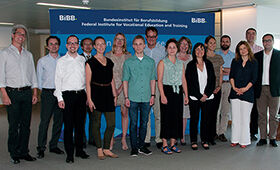Dual training as a strategy to secure a supply of skilled workers in international comparative terms
International team of academic researchers discusses company strategies
On 6 and 7 June 2016, sixteen experts from several European countries and Japan met for a workshop at the Federal Institute for Vocational Education and Training to network on an ongoing research project looking at company dual training strategies in international comparative terms.

Under the chairmanship of Dr. Philipp Grollmann (BIBB), case studies are currently being conducted on the motivation behind (‘why?’) and the organisation of (‘how?’) dual training forms of companies in Spain, Italy, France, Portugal, South Korea, Slovakia and the United Kingdom. Project members from France, Italy and Spain journeyed to the meeting to engage in dialogue on the latest current status of work in the countries, to consult with one another and to network. Academic researchers from the Cologne Institute for Economic Research and from the University of Cologne, who are working on similar research projects at the moment, also attended the workshop and took part in the networking process. In addition to this, two members of Project Council were on hand to enhance discussions by bringing important recommendations and good ideas to the table.
The main focus of the presentations and lively debates was on strategies adopted by companies in the automobile manufacturing sector and motor vehicle serving trade to acquire and secure a supply of skilled workers via various forms of dual training. Particular attention was paid to dual training strategies pursued by German companies abroad. Although no final results are yet available as of this time, it was quickly realised that general legal, political and cultural conditions exert a considerable influence on the extent and organisation of forms of dual training. The seemingly limitless diversity of formal types of dual training, which are often difficult to classify, and the numerous examples of informal training of this sort were perceived as a particular challenge.
Thanks to the findings which emerged from the workshop, all those involved are now able to continue their research work buoyed by new impetuses and ideas. Several case studies still need to be conducted, and a large amount of data remains to be analysed. The results of the study are of particular relevance because they will close a research gap by investigating both the costs and benefits and the quality of dual VET in international comparative terms. In addition, further meetings and cooperation agreements between the project members are already planned, for example with regard to conferences and publications. The first interim results from the study will be presented by BIBB staff members Anika Jansen and Sara-Julia Blöchle at the Austrian Conference on Vocational Education and Training Research.